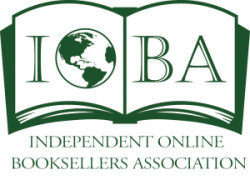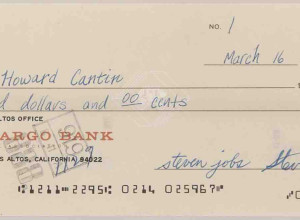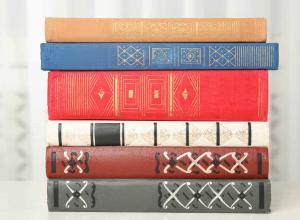Sotheby's to Offer Judge's Copy of "Lady Chatterley’s Lover"
London-The 1960 Chatterley trial, the court case that heralded the transformation of the 1960s and helped to bring to birth a more liberal and permissive Britain, stands as a defining moment in British history. Marking the end of one epoch and the opening of another, it is justly regarded as the most celebrated obscenity trial in British literary history, during which D.H. Lawrence’s infamous novel, Lady Chatterley’s Lover, came under the spotlight and caused a media sensation from Land's End to John O'Groats. It was the trial that sold two million books, but one copy holds a unique place amongst all the others.
The judge’s copy, annotated for him by his wife, and housed for purposes of discretion in a damask bag with ribbon tie, is far from the only copy of the book to have been read with particular attention to the sex scenes, but as a document of the event, it is arguably the most important copy to have survived to this day.
This autumn in London, Sotheby’s is set to offer the very book that the judge carried into court, some twenty-five years after it was acquired at auction by Christopher Cone as a present for his partner, the late Stanley J. Seeger. At the time establishing the highest price ever recorded for a paperback sold at auction, the annotated novel, together with its silk covering and hand-written list inserted within, now comes to auction with an estimate £10,000-15,000, and will be presented as part of a sale of property from their country home on 30 October.
The 1960 Chatterley trial, when Penguin Books were prosecuted for publishing the unexpurgated text of the novel, was of legal significance as it was a test case for the 1959 Obscene Publications Act. The new definition of obscenity lay behind Penguin’s decision to publish the novel, and it was also what enabled the trial to become a confrontation between a permissive and articulate liberal intelligentsia and an outmoded and philistine legal establishment. British attitudes to class, literature, censorship and the intellectual life clashed publicly as rarely before.
Before the trial Lady Dorothy Byrne (d.1969), wife of the presiding judge, the Hon. Sir Lawrence Byrne (1896-1965), read through the novel for her husband and marked up the sexually explicit passages. She is also understood to have stitched the blue-grey damask bag which provides the racy book’s demure covering, no doubt to prevent the press photographers from capturing the judge carrying a copy of the book.
On headed stationery of the Central Criminal Court, Lady Byrne compiled a list of significant passages with her comments - “love making”, “coarse” - noting the page number. These pieces of paper were loosely inserted inside the book, which itself contains her pencil markings, underlining, and occasional marginal notes. Under the new Act it was not enough to count the profanities (although the prosecution did this nevertheless: a work was to be judged obscene “if its effect... is, if taken as a whole, such as to tend to deprave and corrupt persons who are likely, having regard to all relevant circumstances, to read, see or hear” that work). This provided a key role to expert witness who could be considered qualified to judge sexually explicit passages in the context of the whole work.
Consequently, in a move that turned the trial into a spectacular piece of legal theatre, the defence called 35 eminent literary and academic figures, including E.M. Forster, Richard Hoggart, Rebecca West, and the Bishop of Woolwich, to give their opinions on Lawrence’s artistry, intentions, and treatment of sex.
The book also provided an inadvertent answer to the prosecution’s splendidly condescending question in its preliminary address, the absurdity of which raised a laugh amongst the jurors:
“...[W]ould you approve of your young sons, young daughters - because girls can read as well as boys - reading this book? Is it a book that you would have lying around in your own house? Is it a book that you would even wish your wife or your servants to read?”
The jury took just three hours to return their Not Guilty verdict. Mr Justice Byrne’s summing up had been fair but his private views were almost certainly glimpsed in his refusal to award costs, leaving the defendants with a substantial legal bill. Nevertheless, it was a great victory for Penguin -the publisher’s print-run of 200,000 sold out within a day, and sales reached 2 million in two years; a triumph for their avowed mission to make literature accessible to all. It is very likely that the jurors were influenced by the fact that the novel was being published by an imprint that was held in great public affection. In effect, the trial and the book paved the way for the freedom of the written word.
















